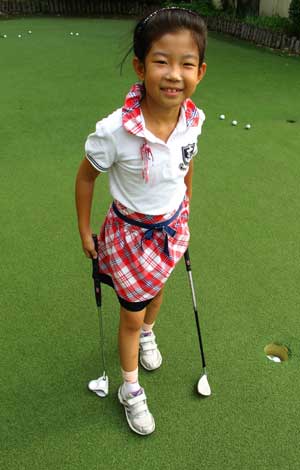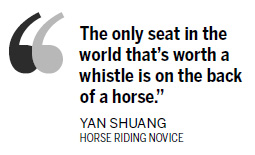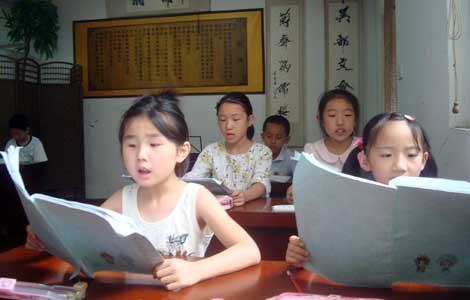Society
Dream merchants
Updated: 2011-08-18 08:14
By Cheng Anqi (China Daily)
|
 Kou Xin, 8, has a lot of fun playing golf, while her mom believes early training can put Kou at an advantage in future competitions. Jiang Dong / China Daily |
|
Si shu, or traditional style schools, that offer guoxue courses are popular among parents and students in Suzhou, Jiangsu province. Wang Jiankang / for China Daily |
 |
Cram schools and camps offering golf, riding lessons and adventure at exotic locales are drawing an enthusiastic response. Cheng Anqi reports.
Zhang Zeqing puts his paddle in the water and sets off in his raft on an exhilarating trip downriver. "If you haven't tried river rafting, you are missing out on an experience of a lifetime," says the 12-year-old excitedly at the Coast-to-Coast outdoor summer camp in the United States, organized by Student Travel Schools (STS) Foundation.
"It is all about communicating and working as a team. When everyone works in tandem, it is much easier to guide the raft down the river and through the rapids," Zhang says.
As summer vacations come to an end, youngsters are grabbing every opportunity to try activities their school days leave little time for.
The three-week camp in the US, that has participants from France, Italy and Poland, besides China, gives the children not only a chance to explore stunning wilderness and breathtaking sights but also helps them learn survival skills through cooking, buying ingredients and pitching tents.
"They have to be organized so the whole camp can move forward," Zhang Dasheng, program manager of STS China office, says.
He adds that increasingly, affluent Chinese parents are looking to give their children a break from the stress of school by sending them to such camps.
They feel the high costs of about nearly 40,000 yuan ($6,184) are justified by the enriching experience the camp offers.
"It encourages students to build character, confidence and skill, and instills in them the values of team work and responsibility," Wu Ping, Zhang's mother, says.
"I want my son to experience every day as a new and exciting adventure."
Pint-sized Kou Xin, a mere 25 kg, drives the ball 77 meters, dead straight, virtually every time. She putts like a dream.
To the 8-year-old, golf is fun. She is blithely unaware of the game's frustrations.
"My Dad has played golf for years but I never tried it until last year when I asked for my own golf clubs," Kou says. She spends every morning with Andrew Gutteridge, her personal golf coach at Shenghua Universal Golf Academy in Beijing.
Wu Haiyan, Kou's mother, thinks nothing of the 700 yuan ($110) each hour training fee.
"I'm proud of her outlook on the game," Wu says, adding that early training can give children a head start and put them at an advantage in future competitions.
"She may stand a better chance of earning a scholarship that can help pay for her higher education," Wu says.
Gutteridge, Kou's coach, says, "Golf is experiencing a boom in Beijing, with more youngsters discovering the excitement of a day at the golf course."
The Australian, who is enjoying his fifth year in Beijing, has taught 320 youngsters to date.
Yan Shuang, 10, began his training at Beijing Equuleus International Riding Club recently to help him cultivate an "aristocratic personality".
"Many parents deem it a noble sport and are willing to spend thousands of yuan on it. Although personality actually has very little to do with how much money is spent on cultivating it and more to do with a child's innate temperament," Wang Wei, general manager of the club, says.
Yan has gone from being an inexperienced rider to an enthusiastic beginner. She is eager to advance her skills and increase her knowledge of horses.
"I have a passion for horses I never thought I would ever have," Yan says, adding that she has also been put through figure skating, ballet and piano lessons.
But what she enjoys most are these dawn-to-dusk summer days on the back of a horse.
"The only seat in the world that's worth a whistle is on the back of a horse."
Even as some Chinese parents want to give their young children a break from studies, academic improvement remains a goal for the vast majority of Chinese children. For them, few vacations are devoid of stress.
A Sina.com survey in June shows that only 18.2 percent of parents will allow their children a totally relaxing vacation, with an overwhelming 71 percent favoring a study-life balance over the two-month break.
But the focus on academic courses may also be linked to the exorbitant costs associated with such esoteric activities as adventure camps.
Figures from National Bureau of Statistics for 2010 show that the urban annual average wage in the Chinese public sector is 37,147 yuan ($5,743).
Meanwhile, average yearly incomes in private sector in fields such as finance and IT are 80,772 yuan and 66,598 yuan, respectively.
So tens of thousands students from ordinary families huddle over notebooks and calculators during this summer break for a full day of math and English lessons at such cram schools as Juren, Xueda and Jinhangxiang.
Just like Li Ran, 15, whose every waking hour is accounted for, in preparation for the high school entrance examination next year.
According to Hao Zheng, Juren's receptionist, the school has 65 branches in Beijing, and training classes for the Math Olympiad were all fully booked a month before the start of the vacation.
Traditionally, most Chinese degree holders have looked to government jobs but today there are more job opportunities in the private sector, where competition is tough.
Education remains the route to professional success.
"That's why parents want their children's studies to be reinforced at a cram school," Hao says.

Specials

Biden Visits China
US Vice-President Joe Biden visits China August 17-22.

Star journalist leaves legacy
Li Xing, China Daily's assistant editor-in-chief and veteran columnist, died of a cerebral hemorrhage on Aug 7 in Washington DC, US.

Robots seen as employer-friendly
Robots are not new to industrial manufacturing. They have been in use since the 1960s.
